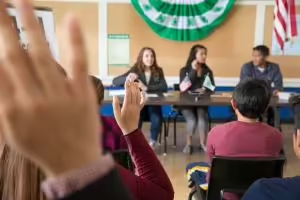PEKIN, Ill. - What do you want to be when you grow up?
This is a question we start asking young people almost as soon as they can talk. And it’s an important question. At its most fundamental level, the question is asking about a young person’s goals – but the conversation should not end here.
Research shows us that effective goal setting techniques can dramatically increase the likelihood of success, but one question about the future isn’t enough to help young people develop the skills needed to reach their goals. They must also learn to layout the steps needed to accomplish those goals, make back-up plans for when things go awry, and heed lessons from their past successes and failures.
The 4-H youth development program intentionally fosters these skills. In 4-H clubs, young people work together, along with their adult leaders, to set annual goals for their groups. They come up with plans to meet these goals and regularly discuss their progress at meetings.
One 4-H club president, Ella, a fourth grader from Peoria county, spoke of her club’s goals to invite guest speakers, do community service, and recruit new members. She discussed the goal setting process, saying, “We basically just voted on who wanted to do what…so we could plan it out and schedule it early.” Ella went on to explain the strategies used toward their recruitment goal, saying “(I wanted) to try to get new members from my class, so we made little new member cards that came with a piece of candy.”
4-H members are also encouraged to set individual goals for their project work and keep records of their efforts. Additionally, the reflection and application components of the experiential learning cycle (the pedagogical model used in 4-H) help young people examine their efforts, look for lessons, and apply them to future endeavors.
In fact, a 2019 survey asked 4-H members in Fulton, Mason, Peoria, and Tazewell counties about their goal-setting practices. It found:
- 88% felt it was important to them to reach their goals.
- 87% took action to reach their goals.
- 82% knew how to make their plans happen.
- 79% developed step-by-step plans to reach their goals.
These practices can help young people succeed now, and help develop skills that will be useful throughout their lives.
SOURCE: Emily Schoenfelder, Youth Development Educator
ABOUT EXTENSION: Illinois Extension, the public outreach and engagement arm of the University of Illinois, translates research-based knowledge into actionable insights and strategies that enable Illinois businesses, families, and community leaders to solve problems, adapt to changes and opportunities, make informed decisions, and carry technical advancements forward into practice.
